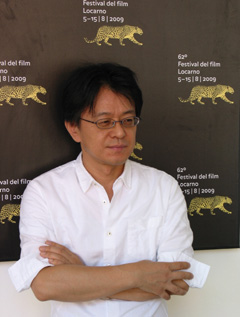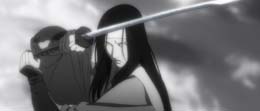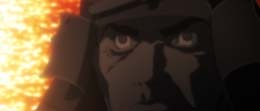Interview with Mizuho Nishikubo (2)
 | Mizuho Nishikubo Born in Tokyo on January 15, 1953, Nishikubo is a longtime and most trusted collaborator of Mamoru Oshii, and has participated as sequence director (but under his real name of Toshihiko Nishikubo) in all Oshii's works since Patlabor 2: The Movie (1993), namely Ghost in the Shell, Cannes Palme d'Or-nominated Innocence and Golden Lion-nominated The Sky Crawlers. It is said that Oshii's movies would not look the same without his contribution. He uses his alias Mizuho Nishikubo when he directs. After graduating from Waseda University, Nishikubo joined Tatsunoko Production in 1975, and in 1979 became a protégé of Osamu Dezaki, one of Japan's most respected animation directors. His collaborations with Dezaki include TV series Lady Oscar (1979) and Ashita no Jo 2 (1980). Nishikubo made his directorial debut in 1983 with Mitsuru Adachi's romantic comedy Miyuki (1983, TV series). Other credits include Red Photon Zillion, (1987, TV series) Legend of Heavenly Sphere Shurato (1989, TV series), Video Girl Ai (1992, OVA) and Otogi Zoshi (2004, TV series). He also directed the music clip Tsepi i kol'tsa / Chains & Rings (2003) for the hugely popular Russian rock star Linda. His movie, Musashi: The Dream of the Last Samurai screened in Locarno, Sitges, Warsaw and Stockholm |
Part 2
Westerners and Japanese may have a different perception of The Book of Five Rings. Is this book still inspiring Japanese people and what is your opinion in particular?
I think that for Japanese people, The Book of Five Rings is commonly perceived not as a swordfight manual but as a text about spiritual teachings. Businessmen use it as a reference book for survival in the business jungle, and young students read it as an introduction to the Japanese spirit.
As far as I'm concerned, it is true that the second half of the book has a strong spiritual connotation. Nevertheless, in its essence The Book of Five Rings is a treatise on fighting techniques. Inside this context we can appreciate Musashi's rational mind applied to combat strategy, in a groundbreaking approach that defied the conventions of his time.
It was Musashi's utterly rational aspect that eventually attracted my interest. And above all, my curiosity toward Musashi the man was fueled by the observation of the fact that in the introduction of his own book he'd described his remarkable score of duels and that he was never defeated, and yet he never mentioned the episode that brought him to popularity or the Ganryujima duel against Sasaki Kojiro.

So why a movie about Musashi now? Did you intend to trace any vector or link to today's society?
As it is said in the movie, Musashi was a man misplaced in time. He pursued perfection in the art of war in days when war had virtually ended in Japan. Sekigahara was the battle that established the power of the Tokugawa rule over Japan, the great battle that ended all wars for two centuries, with the exceptions of the siege of Osaka castle and the Christian rebellion in Shimabara. Musashi found himself at this turning point of history, and arrived late. I think it might be somehow related to the fast shifting society we are living in, where it has become so difficult to define ourselves and understand what we are. It has also something in common with our generation -mine and Oshii's. We both saw the student protests during the late 60s, but we were too young to be really part of them. When we became old enough, everything was just over. Our generation missed the season of politics. And Woodstock too, as far as I'm concerned.

Talking about Woodstock, you are famous for your interest in music. What is the role of music in the movie?
Music is probably the main reason I decided to join this industry. When I was younger I started playing in a band, but I had not talent enough. Working in the film industry allowed me to stay in touch with music at professional level.
As for Musashi, at first I thought I could use some silent-movie style narration for the samurai action scenes, but then I decided to go one step further.
Again, I separated completely the music style for the 3D part and the samurai action sequences. For the documentary-style part we selected well-known pieces of classical music. For the 2D part, we had the privilege to collaborate with Takeharu Kunimoto. He is a professional rokyoku performer, and he likes to blend traditional sounds with modern arrangements. So he wrote and performed for us with his shamisen, but added acoustic guitar, electric bass, drums and keyboards. It was a great and challenging experience, because for the first time we had musicians playing live inside the sound recording studio, which basically is devised for voice actors only. The result is sometimes rock, sometimes funky, and always mind-blowing. I could not ask for more.
As for the last question, can you tell us about the highlights of this movie, and give us a message for the audience?
In this movie we tried to answer to a very basic question: why did Musashi never mention the duel with Sasaki Kojiro, otherwise the most renowned episode of his life in popular imagery? Isn't this omission odd for a man who boastfully claimed to have fought more than 60 duels and never lost? I hope that with this movie, you will re-discover Musashi as a man and the essence of his swordsmanship from a completely different perspective.
(2 - end)
© 2009 Production I.G / Musashi Production Committee

![WORK LIST[DETAILS]](/contents/works/design/images/left_title.gif)



 terms of use
terms of use